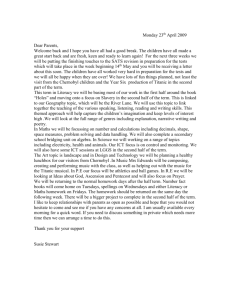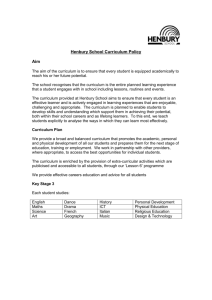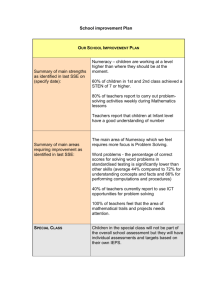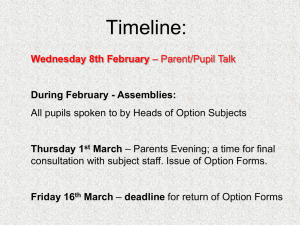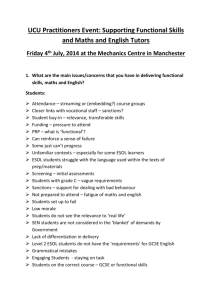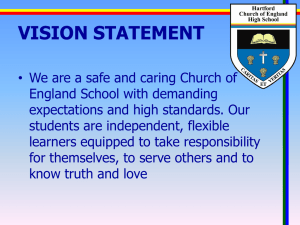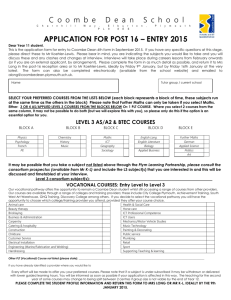Functional Skills Powerpoint
advertisement
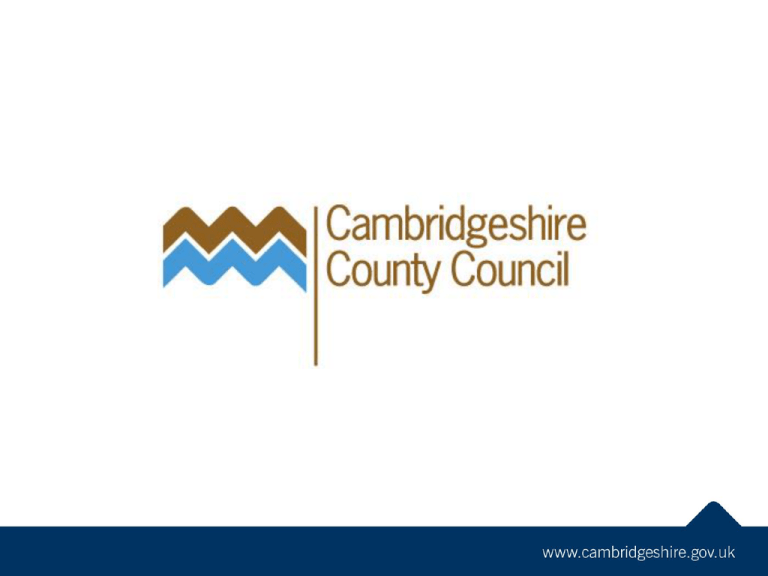
Functional Skills in Health and Social Care Lisette Veit 4th March 2014 What are we talking about? English (Speaking & Listening, Reading, Writing) Maths ICT ESOL (English for Speakers of Other Languages) Functional skills are the fundamental, applied skills in English, mathematics, and information and communication technology (ICT) which help people to gain the most from life, learning and work. How do they work? Selection, application and evaluation of a range of skills to tackle tasks and problems in life and work GCSE Apprenticeships WPL FE Functional Skills Standards Adult Core Curricula ACL Levels Adult Curriculum Level National Curriculum equivalent Level 2 GCSE grade C+ Level 1 Year 9 – GCSE Foundation Entry 3 +/- Year 6 Entry 2 +/- Year 3 Entry 1 Infant school ESOL Entry 1 – the minimum level that immigrants from non-English speaking countries outside of the EEA need to enter the UK Entry 3 – the level of speaking and listening required in order to obtain settled status Level 1 and 2 – ESOL qualifications removed; Functional English is preferred qualification. So… Self audit – how are your own English, ICT and maths skills? Can you challenge yourself to improve? How? Maths Six out of every 400 bottles of disinfectant are found to be defective. If you buy four bottles, what is the probability that one will be defective? English Write a letter to the Health Authority objecting to the plans to close the hospital. In your letter you must expand on these points: • the history of the hospital • the loss of a major community service • access by local residents • the distance to nearest hospitals. You will be assessed on: • presenting information on complex subjects clearly and concisely • using a range of writing styles for different purposes • using a range of sentence structures, including complex sentences and paragraphs to organise written communication effectively • punctuating written text using commas, apostrophes and inverted commas accurately • ensuring written work is fit for purpose and audience, with accurate spelling and grammar that supports clear meaning in a range of text types. ICT The librarian needs you to create a database of the books that are on loan. You have been given a file with this information. Make sure all the data types are set correctly. Take a screen print of the completed database design and paste it into your evidence document. Use the database to create a report of the books that are overdue, as they were due back on or before 01/04/2011. Include only the Book Title, Author, ISBN Number, Title, Initial and Surname of the person who has borrowed the book and Date due back. Check that your work is formatted correctly. Make sure that the report is clear and easy to read. Print a copy. Health Care employees What level of English, maths and ICT do we expect of those working in Health and Social Care? How do we assess the levels of existing and potential new employees? How do we fill the gap between what we expect and what we have? The Good News Diagnostic tools to assess for skills gaps are available Some provision can be funded or joint funded Resources specific to health and social care are available Cambs CC Adult Learning and Skills can speak to you about building a strategy to address your needs. Questions Lisette.veit@cambridgeshire.gov.uk Dawn.coleman@cambridgeshire.gov.uk
